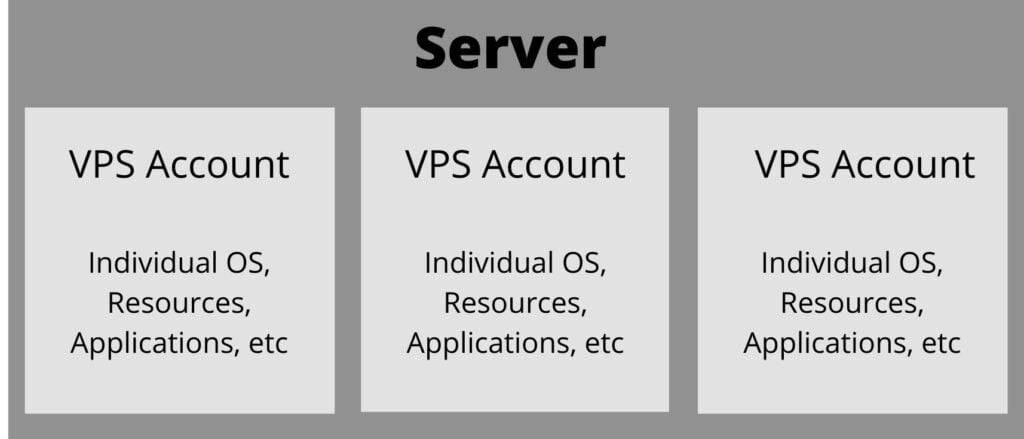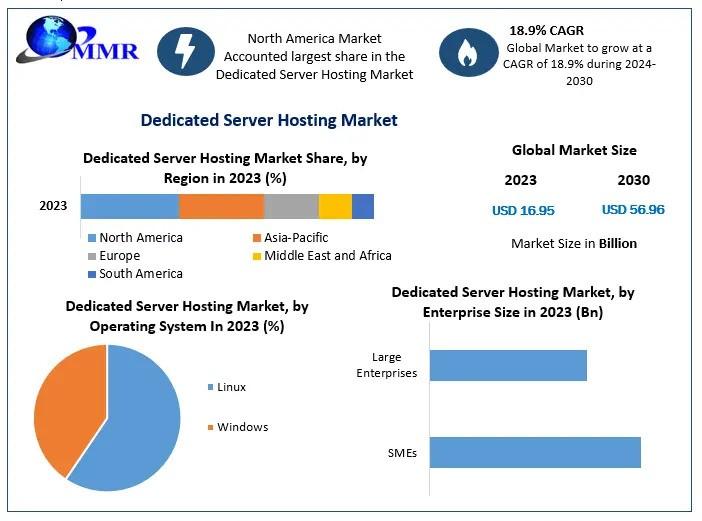
Web hosting comes along in a few key flavors. While many web hosts may market various types of hosting, these are more purpose-built. For example, WordPress hosting typically implies plans that come with that content management system (CMS) pre-installed.
The main types of web hosting are actually shared, Virtual Private Server (VPS), Cloud, and dedicated server. In some cases, web hosts may use Cloud technology to deploy VPS solutions, such as the Managed Cloud VPS ScalaHosting offers.
Each of these types of web hosting are defined by distinguishing characteristics. In this article we’re going to explore the differences between VPS and dedicated server hosting.
What is a Virtual Private Server?
VPS accounts, as the name implies, are virtual. This means that software is used to simulate each account and define its characteristics. Because of this, multiple VPS accounts can be created and hosted on a single physical server.
The way that this is designed means that each VPS account is isolated from each other. At the same time, every account gets a dedicated amount of resources such as processor, memory, and bandwidth. For all intents and purposes, the VPS acts as an entire server for each user.
While this may bring a long several benefits it does mean that VPS hosting users normally need to have higher levels of technical competence. Everything needs to be installed and configured from the ground up.
While in many cases the hosting company may include a pre-deployed OS of your choice, it will still require configuration for your needs. Usually, you will have to install other elements of the Linux–Apache-MySQL-PHP (LAMP) stack on your own.
Traditional vs Cloud VPS
There are technically two kinds of VPS hosting that exist today. The first is the traditional VPS, which makes use of single physical servers to host the accounts. The second is Cloud-based VPS like that which ScalaHosting offers.
Cloud-based VPS applies the same virtualization technologies in a distributed environment. This results in much higher scalability and reliability than traditional VPS models.
VPS can be Managed or Unmanaged
The main differences between these are cost and what comes included with the plans. For example, in unmanaged VPS hosting, you are wholly responsible for the configuration and maintenance of anything that’s being run on your VPS.
Managed VPS accounts are those in which the web host will assist with technical upkeep, system monitoring, security, and a few other areas. This type of VPS hosting will benefit those with lower technical inclinations or simply do not wish to focus more on their core business.
What is a Dedicated Server?
The concept of a dedicated server is simple – you get the entire piece of hardware. Think of it as being similar to renting a personal computer. Once the dedicated server is in your hands, you are responsible for everything from environment configuration to application deployment.
Dedicated servers will only have one customer each and every resource the server has is completely at your disposal. Although there are benefits to this, dedicated servers are generally much more expensive than most VPS hosting.
In the past, dedicated servers were the next progressive step up from VPS hosting. This was in part due to physical limitations of server hardware. By the time users scaled up sufficiently to use the resources of an entire server – it would already be at the stage of dedicated hosting.
Advantages of VPS
The way that VPS accounts are designed gives them several natural advantages.
- Dedicated resources on a VPS means that you can expect much better performance. When resources are shared, applications must wait if the resources needed are being utilized by another user. If there is no sharing, resources allocated to your VPS will remain idle even when not in use. This makes them ready to go anytime they are needed.
- Account isolation on VPS means that each virtualized environment is 100% self-contained. Unless something happens on a server-wide scale, your account will not be affected by external incidents. Because of this, you enjoy greater reliability and security on VPS hosting.
- Easy scalability is part of what defines VPS hosting. Any times you need more resources, they can be requested quickly and easily. There is no need to apply for and migrate to a better hosting plan just to get access to increased resources.
- Greater control is available to VPS users since it is essentially the same environment as a server. You can choose every element of your deployment from what applications you use to how they are configured. This gives the potential for competent users to create extremely streamlined and purpose-driven environments.
- Cost is also managed much more effectively. For example, ScalaHosting Managed Cloud VPS accounts start from as little as $9.95/mo which is a price tag even lower than what some companies offer for shared hosting. It’s also more cost effective for growth since you only pay for what you need.
Advantages of Dedicated servers
For as long as web hosting has been around, dedicated hosting has always been seen as the ultimate level. This is because it has multiple benefits, especially compared to shared hosting.
- Performance is without a doubt one of the key selling points of dedicated servers. The capacity to use everything that a server has to offer without exception means power is available on-demand, and as much of it as you want.
Companies can sometimes make use of dedicated servers to meet regulatory demands. For example, in some counties, there are legal guidelines on how data must be hosted. In some cases, this means they have to reside on their own server in specific locations.
- Mission-critical deployments are also typically made on dedicated servers since they offer the ultimate in resource handling and allocation. Dedicated servers are more streamlined since there is not even the need for the server to manage any virtualization technology.
- Cost-effectiveness can also be observed in some situations, especially where larger non-IT related companies are concerned. By using dedicated server hosting, these companies remove the need to purchase and maintain enterprise-grade equipment and can remain focused on development of their key business areas.
- Security is further enhanced over VPS hosting since the sole owner of the dedicated server can have greater control over points of data entry and egress. Often, this security is even extended to the physical level where only authorized persons will be permitted access to the actual hardware.
VPS vs Dedicated Hosting: Which Should Your Business Choose?
Because both VPS and dedicated hosting are so versatile, there are a few levels of consideration to work along when it comes to the question of who should be using what. For example, volume of traffic, nature of deployment, and even technical competency.
In general, VPS hosting would be better for websites that have medium to high levels of web traffic. It is also suitable for reasonable use in web application deployment and small to medium eCommerce deployments.
Dedicated hosting is more suitable for websites with heavy volumes of web traffic or those that handle more mission-critical deployments. It is also better for use in large-volume eCommerce sites or where there are specific needs like the meeting of regulatory guidelines.
Conclusion
The line between VPS hosting at many times is a very fine one. In the majority of cases, it is recommended that users look towards VPS first, before deciding if they eventually wish to deploy on to a dedicated server.
A large part of this has to do with cost effectiveness. The scalability in power and cost of VPS means that it offers users access to much better performance at hard-to-beat prices. Where dedicated servers are involved, your resources utilization growth needs to be taken into consideration beforehand – and paid for at those levels consistently.
Unless you’re forced to by circumstances, VPS would be the more logical choice between the two, especially if you’re simply moving up from shared hosting.
Frequently Asked Questions
What is the biggest difference between VPS and dedicated server?
Scalability in cost. VPS accounts have a much lower cost of entry and this can be gradually increased as your resource needs expand. Dedicated hosting requires that you plan for this in advance and pay the highest cost right from the onset.
Why is VPS so expensive?
Not all VPS plans are expensive. However, various elements factor into the cost such as the starting amount of resources. Add-ons such as control panels may also further bump up prices. Ideally, look towards all-inclusive plans like those offered by ScalaHosting Cloud VPS which include SPanel as the most cost effective option.
Is there any free VPS?
Technically yes. However, these are exceedingly rare and typically only available for users to experiment with and experience. Free hosting also comes with increased risk that your data may be used or sold without your knowledge.
What can I use a VPS for?
Aside from being used to host websites, VPS hosting can be used for many other purposes. For example, the deployment of web applications, or simply even as file storage. You’re essentially getting a remote server that’s open for any usage model as long as it does not violate your terms of agreement with the hosting provider.
What is a VPS – Everything you need to know!
https://www.scalahosting.com/blog/vps-vs-dedicated-server-which-hosting-solution-fits-your-business/






